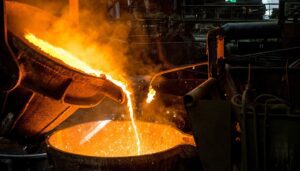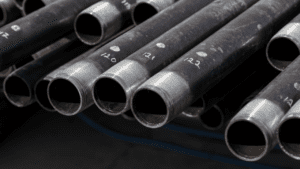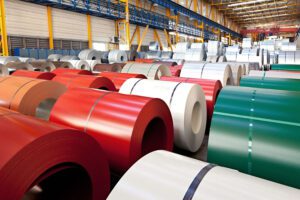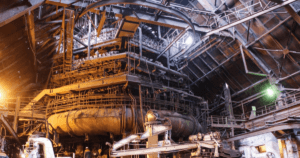
Metinvest’s network of steel service centers in Ukraine, Metinvest-SMC, has donated steel to the Pivden Operational Command as part of Rinat Akhmetov’s Steel Front initiative to manufacture mobile buggy vehicles, which are in high demand at the frontline.
According to the press release, a buggy is a small light vehicle with high cross-country ability with open wheels, used for off-road driving. There are no such vehicles in service in Ukraine. Activists, volunteers and representatives of some military associations manufacture and supply them.
It is noted that buggies are compact, fast, maneuverable, have high cross-country ability and are easily camouflaged. They are relatively inexpensive and are indispensable in reconnaissance missions, able to attack in small groups and make quick raids behind enemy lines. That is why the buggy is a good alternative to a conventional wheeled vehicle on the front lines.
Metinvest-SMC was recently approached by representatives of the UC Pivden: the military needed equipment for the production of buggies. At their request the company provided 3.8 tons of rolled metal – angles, sheets, and tubes – for the manufacture of 10 front minivans, free of charge.
According to the press service, everyone can also help the defenders of Ukraine: if there are any unused old Zhiguli 01-07 cars, they can be transferred to the AFU (Operational Command South in FB or e-mail coll-centr_ok_pivden@post.mil.gov.ua).
It is recalled that Metinvest group has already allocated 1.6 billion UAH for the projects of Rinat Akhmetov’s Steel Front military initiative.
“Metinvest” is a vertically integrated mining group of companies. Its main shareholders are SCM Group (71.24%) and Smart Holding (23.76%) that jointly manage the company.
Metinvest Holding LLC is the managing company of Metinvest group.

Metinvest in 2022 reduced steel production by 69% year-on-year to 2.918 mln t, parent company Metinvest B.V. said in a press release.
According to it, the production of pig iron declined by 72% to 2.743 million tons, coke – by 64% to 1.653 million tons, including merchant coke – by 49% to 811 thousand tons.
At the same time, it is specified that in connection with the beginning of a large-scale military aggression of the Russian Federation against Ukraine, since 24 February 2022, Metinvest decided to suspend the production activities of a number of its enterprises in Mariupol, Avdiivka and Zaporizhia, including Azovstal, Illich Iron and Steel, Avdiivka Coke and Zaporizka Coke. Later, the group’s Zaporizhia companies resumed production. However, the company’s enterprises in Mariupol and Avdeevka suffered as a result of hostilities, while Mariupol is currently temporarily occupied.
It is also noted that Ukrainian enterprises of the group, except those located in Mariupol and Avdeevka, continue to operate at different levels of utilization, taking into account security factors, availability of electricity supply, as well as logistical and economic factors.
In 2022, production of commercial semi-finished products decreased by 70% to 1.022 mln tons, due to a significant decrease in the production of liquid pig iron. This was partially offset by the consolidation of commercial billet production volumes at Kametstal’s facilities.
In 2022, production of finished products decreased by 62% to 2.777 million tonnes. The production of flat products decreased by 4.247 million tonnes to 1.731 million tonnes due to the stoppage at the Mariupol mills, and the lack of a stable supply of slabs for Italian rolling mills in the first half of the reporting year. Production of long products decreased by 71,000 tonnes, to 1.018 million tonnes, due to stoppages at Azovstal from the end of February 2022 and lower production at Promet Steel due to irregular intragroup supplies of billets.
This, in turn, was partially offset by consolidation of production volumes at Kametstal’s facilities. At the same time, production of rails and pipes decreased by 38 and 100 thousand tons to 10 and 18 thousand tons, respectively, as the products were produced at Mariupol.
In 2022, coke output decreased by 64% to 1.653 mln tons.
“Last year, Metinvest also reduced the production of total iron ore concentrate (iron ore concentrate) by 66% year-on-year to 10.712 million tons, the output of marketable iron ore products decreased by 55% to 7.903 million tons, including the volume of marketable concentrate – by 60% to 4.718 million tons, and the volume of marketable pellets – by 45% to 3.185 million tons.
In 2022, the production of coal concentrate by the group decreased by 11% to 4.959 million tons, mainly due to the lack of qualified personnel at its coal assets and deteriorating geological conditions at United Coal Company (USA) mines.
As reported, Metinvest in 2021 increased the steel output by 15% compared to 2020 – up to 9.533 million tons, iron – also by 15%, to 9.709 million tons, but reduced the total production of coke by 5% to 4.551 million tons. In 2021, the Group increased the total production of iron ore concentrate by 3% to 31.341 million tons, the production of pellets by 18% to 5.811 million tons and the total production of coking coal concentrate by 92% to 5.542 million tons.
“Metinvest consists of mining and metallurgical enterprises located in Ukraine, Europe and the USA.
The major shareholders of Metinvest are SCM Group (71.24%) and Smart Holding (23.76%) that jointly manage the company.
Metinvest Holding LLC is the management company of Metinvest group.

In January-September 2022, the international vertically integrated steel and railway company Interpipe cut its steel output by 36.3% year-on-year, to 463 thnd mt.
According to the presentation of the company results for the first nine months of last year, the output of pipes decreased by 30.2% to 309 thousand tons, railway products – by 49.6%, to 64 thousand tons.
In Q3-2022, steel output stood at 177 thnd mt (a 43.9% increase on Q2-2022), pipe output – at 105 thnd mt (a 4.5% decrease), railroad output – at 24 thnd mt (a 33.3% increase).
As previously reported, in 2021, Interpipe increased steel output by 28.1% compared to 2020 – up to 971 thousand tons, pipe output increased by 32.5% – to 614.8 thousand tons, while production of railway products decreased by 9.7% – to 172.1 thousand tons.
“Interpipe is a Ukrainian industrial company, which produces seamless pipes and railway wheels. The company supplies its products to over 80 countries all over the world through a network of commercial offices located in the key markets of the CIS, the Middle East, North America and Europe. In 2021, the company sold 602 thnd mt of tubes and 174 thnd mt of railroad products. The company sells its railroad products under the KLW brand.
There are about 10 thsd. employees in Interpipe.
The company consists of five industrial assets: “Interpipe Nizhnedneprovsky Tube Rolling Plant (NTZ)”, “Interpipe Novomoskovsk Tube Plant (NMTZ)”, “Interpipe Niko Tube”, “Interpipe Vtormet” and the electric steelmaking complex “Dneprosteel” under the brand name “Interpipe Steel”.
The ultimate owner of Interpipe Limited is Ukrainian businessman Viktor Pinchuk and his family members.

By the end of this year, metal prices and logistics costs have dropped significantly, which should help the demand
Russia’s military aggression against Ukraine has had a significant impact on the entire economy and the construction industry in particular. However, after a few months of war, some of the customers have already returned to the construction of commercial objects that were frozen at the beginning of the full-scale war or damaged as a result of the hostilities.
Current situation
Rauta is a leading supplier of modern solutions for quickly erected buildings – sandwich panels, ventilated metal facades, steel frames, load-bearing profiles, etc. The company offers services in design, installation of supporting and enclosing structures, as well as general contracting on objects of any complexity. The main focus of the company’s business is the import of Ruukki products for commercial construction projects. We use production facilities located in Poland, Estonia and Ukraine.
After the beginning of the active war phase due to a significant decrease in demand for our products the company’s business was significantly reoriented. We began to be approached by clients with requests to rebuild buildings destroyed in the fighting. Having a deep understanding of the technologies and principles of reconstruction, we began to actively engage in the restoration of buildings and made it a separate line of business. Whereas before February 24 the company was restoring only one building in Kiev, by the end of 2022 we had implemented 7 projects in three cities of Ukraine, and the start of reconstruction of several more is planned for 2023.
Growth against the backdrop of a falling market
In 2021 there was a situation on the market when the demand for Ruukki products greatly exceeded the capacity of production and the factories were not able to fulfill all orders. Starting from 24 February, the number of orders for new construction projects decreased sharply, and the main deliveries were for objects that began construction last year. Fortunately, almost all of our sandwich panel customers continued to build facilities. Among them are low-temperature warehouse and business center in Kiev, dairy farm and dairy plant in Ternopil region. Therefore, in 2022 Rauta has a 40% year-on-year decrease in sales, which is a relatively good indicator against the background of a more than 70% fall in the sandwich panel market. At the same time, thanks to the growth of the construction and general contracting services area, the company’s total revenue increased by 7% compared to 2021.
Price waves
Ruukki products are made only from European rolled steel, the price of which rose to a peak in August 2021 and halved in early 2022. At the same time in the cost of panels, galvanized steel with polymer coating accounts for about 25%.
At the same time, given the substantial increase in the cost of transportation services and the rise in the euro, the price of imported sandwich panels for the year increased by 50% in hryvnia equivalent. Nevertheless now there is a tendency in the market to considerable decrease of transport cost as well as inertial fall of world steel prices that in the nearest perspective can lead to reduction of sandwich-panels prices by 15-20%.
The main method of delivery in the market of metal construction is road transport. In 2021 the cost of delivery by truck from Poland to Kiev was about 65 thousand UAH. In the spring of 2022 delivery from Poland due to rising fuel prices and limited supply of transport has doubled in price, and in December 2022 was back to the prewar level.
In 2021 the peak cost of load-bearing steel reached almost 70 thousand UAH per ton, mainly due to the high cost of rolled steel. At the end of 2022 due to the decline in metal prices by almost half the cost of steel decreased by about 23% – to 54 thousand UAH per ton.
Recovery Opportunities.
In the spring of 2022, when the company had less workload on the main projects, we have developed a technology for the construction of frameless houses made of sandwich panels, which can be used for ultra-fast construction of houses and cottage towns. To demonstrate the benefits of this technology, we plan to install two demonstration frameless houses near Kiev. For this purpose we have already made house sets in Poland for 20 and 40 square meters houses and we are going to install them in spring. Now we can see the interest in this technology on the part of institutional funds and private investors in the segment of cottage building, which will grow rapidly after Ukraine’s victory.
Another innovation of ours is the development of technology for construction of multistoried buildings using sandwich panels as outer walls, which allows a developer to get up to 5% more space.
In general it can be noted that the technology of rapid construction with steel solutions has a great perspective in the reconstruction of commercial real estate – where the investor understands: the sooner the business is built, the sooner it will begin to bring income.
CONSTRUCTION, DEMAND, galvanized steel, RAUTA, STEEL, STEEL CONSTRUCTION

Mining company Rio Tinto PLC plans to create another, larger, plant to process iron ore for subsequent steel smelting, operating on raw biomass instead of coking coal.
The decision was made after the success of the first pilot project implemented in Germany, writes MarketWatch. The project has been running for the past 18 months in conjunction with Finland’s Metso Outotec and the University of Nottingham.
“The results of the first test phase are very promising,” said Rio Tinto Chief Commercial Officer Alf Barrios.
The location of the new plant has not yet been selected.
The steel industry accounts for 8 percent of the world’s carbon dioxide emissions, MarketWatch noted. Creating yellow ore processing plants using biomass instead of coal would help Rio Tinto’s plans to reduce emissions.

Metinvest, the largest Ukrainian mining and metallurgical holding, in January-March this year reduced steel production by 8% compared to the same period last year and by 25% compared to the previous quarter – to 1.962 million tonnes, according to a press release from the parent company Metinvest B.V.
According to the report, production of pig iron decreased by 15% and 31% respectively – to 1.828 million tonnes, coke – by 33% and 28% respectively, to 783,000 tonnes.
Metinvest added that in January-March this year, the group reduced the total production of iron ore concentrate by 3% compared to the same period last year and by 10% compared to the previous quarter, to 2.786 million tonnes.
The output of pellets amounted to UAH 1.281 million, which is 35% less than in Q1 2021, but 34% more than in the previous quarter, while the output of coking coal concentrate in the first quarter of this year increased by 29% compared to Q1 2021, but decreased by 14% from Q4 2021 – to 1.276 million tonnes.
Metinvest is a vertically integrated mining group of companies that manages assets in every link of the production chain from iron ore, coal mining and coke production to the production of semi-finished products and finished products from steel, pipes and coils, as well as production of other high value-added products. The group consists of mining and metallurgical enterprises located in Ukraine, Europe and the United States, has a sales network covering all key global markets.
Metinvest’s main shareholders are SCM Group (71.24%) and Smart-Holding (23.76%), which jointly manage the company.
Metinvest Holding LLC is the management company of Metinvest Group.